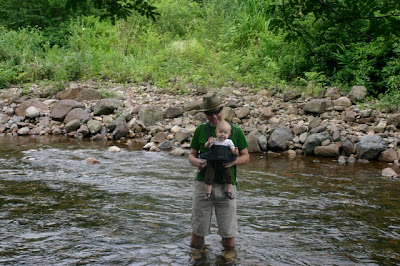 Not an amazing story: babies learn what they want, and the learn to show it. But what's interesting here is that Helena doesn't want the baby carrier. She wants to go for a walk. The Baby Bjorn has become a symbol of her real desire, which is to go out in the street to see dogs, pick flowers, and meet people. It's a complicated sort of symbolism, but a process of signification none the less. Something stands in for something else.
Not an amazing story: babies learn what they want, and the learn to show it. But what's interesting here is that Helena doesn't want the baby carrier. She wants to go for a walk. The Baby Bjorn has become a symbol of her real desire, which is to go out in the street to see dogs, pick flowers, and meet people. It's a complicated sort of symbolism, but a process of signification none the less. Something stands in for something else.In fact, Helena is less involved in metaphor and more in metonymy, where the symbol participates in the signified, in some small way. If Helena were to associate a frying pan with her afternoon walks, that would be a metaphor, but because we use the baby carrier as a part of the walk, it's metaphor or synecdoche.
It might seem that this distinction matters only to linguists and rhetors -- and that's probably what Helena thoughs as I tried to explain it to her on a walk yesterday -- but it does say something important about the way that humans learn language. Augustine's famous description of learning words involves adults pointing at things and then saying their names, but I think that idea doesn't work for Helena yet. Instead, she learns symbolization in a series of small steps, taking a part of the walk and making it stand in for the whole experience. The next step, I think, will be to see that the symbol need not have anything to do with what it symbolizes. That -- according to child neurologists, at least -- will be years in coming.







